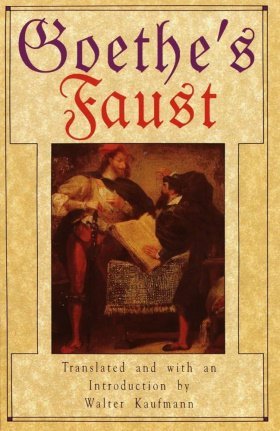Mephistopheles. [to Faust]
Hither to me!
Voice. [from within, dying away]
Henry! Henry!
[The End]
FOOTNOTES.
Introduction
[i1] De Dæmonibus, Ficini, Aldus; and Horst, Zauber-Bibliothek, vi. p. 72.
[i2] Giordano Bruno de Monade, numero et figura, apud Horst, Z. B. iii. p. 70.
[i3] John xii. 31; 1 John iii. 8; and the remarks in Bretschneider’s Dogmatik, § 108.
[i4]
“The weary bitterns in the fen
Are booming—never mind them.”
Walpurgis-Night’s Dream.
[i5] See this particularly proved of Ficinus, in Buhle’s Geschichte der Philosophie, vi. theil. § 889.
[i6] Buhle, ubi subra, § 897.
[i7] The most deliberate attempt of this kind that I have seen, is that of Dürr, in the sixth volume of Schellhorn’s Amœnitates Literariæ; where the story of Faust is called “Historiola pueris et aniculis credita;” and the hero himself, “Doctor Faust fictitius ille et imaginarius.”
[i8] Faust, eine Tragœdie, von August Klingemann, Leipzig, 1815; of which there is a good account in one of the numbers of Blackwood’s Magazine.
[i9] Christ. Aug. Huemann’s Glaubwürdigste Nachricht von D. Fausten. In einem Schreiben an Herrn D. Haubern. Bib. Mag. vol. iii. p. 84.
[i10] Die Sage von Doctor Faust, von D. Christian Ludwig Stieglitz, in Raumer’s Historiches Taschenbuch, 5ter Jahrgang, Leipzig, 1834. The same number contains a dissertation on Wallenstein.
[i11] Apud Heumann.
[i12] From the Latin of Manlius. Apud Heumann, ut supra.
[i13] Wierii Opera, Amstelodami, 1660. De Magis Infamibus, p. 105. He is as little favourable to our hero as Manlius. He says, indeed, that he practised magic over the whole of Germany, “cum multorum admiratione;” and that “nihil non potuit,” but it was all “inani jactantia et pollicitationibus.”
[i14] Disquisit. Mag., lib. ii. dissert. 12.
[i15] Apud Stieglitz, ubi supra, p. 130.
[i16] I suppose Begardi alludes to the world-renowned Philippus Aureolus Theophrastus Paracelsus Bombastus von Hohenheim.
[i17] In a letter dated 20th August 1507.
[i18] Camerarius, Hor. Suceessiv. cent. 2. page 314. Conrad Gesner, Onomasticon apud Stieglitz, Sage von Faust.
[i19] The life of Paracelsus is very characteristic of the age, and may be seen in Sprengel’s Histoire de Medecine, § 9. art. iii.
[i20] That Faust might attain universal celebrity, the fame of authorship could not be wanting. Besides being the reputed author of his own life and exploits, published by his executor Wagner after his death, there are extant magical works under his own name,—perhaps not more authentic than those ascribed to Solomon,—of which one of the most curious is reprinted by Horst, Zauber Bibliothek, vol. iii. p. 86, with the following title, “Doctor J. Faust’s Book of Miracles, Art, and Wonders, or the Black Raven,—also called the Threefold Hell-compulsion; wherewith I compelled the Spirits to bring me whatsoever things I pleased, whether gold or silver, treasure great and small, and the springroot (a magic plant), and whatever other such things are upon the earth; all this have I brought to pass by means of this book, and was also able to dismiss the spirits as often as I pleased.” The introduction to this book by Doctor Faust himself is curious, but too long for insertion. The warning, however, with which it concludes is too serious to be omitted, “Above all things, beware of entering into compacts with these Spirits, that it may not fare with you as it has fared with me.”
[i21] Roscoe’s German Novelists, vol. i. To which the curious may add (1.) Faust: dans l’Histoire et dans la, Legende par Ristelhüber. Didier. 1863. (2.) Faustus: his life, death, and doom, a romance in prose; from the German. London: Kent and Co., 1864. (3.) Auerbach’s Volksbuchlein. München, 1839.
[i22] See notes to Manfred.
[i23] Martin.
Faust
[1] Apollyon, Beelzebub, Satan.
[2] A cant word for a sword.
[3] Dudelsack. A bagpipe.
[4] Rabenstein. Place of execution.
notes
Note I.

























